Week 122: 29 December 1941 – 4 Jan 1942
As the old year ended with the German army on the defensive fighting off Soviet attacks in the Russian winter, it was clear that Operation Barbarossa had failed,; a new German campaign in Russia would have to wait for the summer of 1942. The Japanese army continued its rapid advance, however, occupying Manila in the Philippines and most of Borneo. And the United Nations was born with the New Year when 26 Allied nations agreed not to make a separate peace with Germany, Italy or Japan.
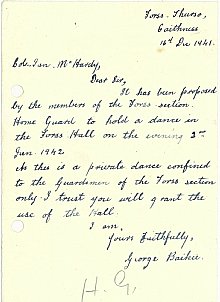 By all accounts, Caithness welcomed in the New Year of 1942 more quietly than in the past. Even so, parties and dances were held across the county. The Forss section of the Home Guard had previously written to Colonel Ian McHardy for permission to hold a dance in Forss Hall on the evening of 2 January: “As this is a private dance confined to the Guardsmen of the Forss section only I trust you will grant the use of the Hall.”
By all accounts, Caithness welcomed in the New Year of 1942 more quietly than in the past. Even so, parties and dances were held across the county. The Forss section of the Home Guard had previously written to Colonel Ian McHardy for permission to hold a dance in Forss Hall on the evening of 2 January: “As this is a private dance confined to the Guardsmen of the Forss section only I trust you will grant the use of the Hall.”
 Other dancers were for the purposes of fundraising. The log book of Gillock School in Bower notes, “A dance was held here on the 31st ult. in aid of Bower Nursing Association Funds. The proceeds amounted to £4.”
Other dancers were for the purposes of fundraising. The log book of Gillock School in Bower notes, “A dance was held here on the 31st ult. in aid of Bower Nursing Association Funds. The proceeds amounted to £4.”
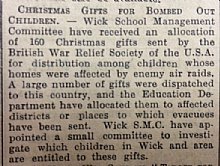 American charities sent Christmas gifts to the needy in Britain. The John O’Groat Journal reported that “Wick School Management Committee have received an allocation of 160 Christmas gifts sent by the British War Relief Society of the U.S.A. for distribution among children whose homes were affected by enemy air raids.” The gifts were allocated to affected districts, or places to which evacuees had been sent.
American charities sent Christmas gifts to the needy in Britain. The John O’Groat Journal reported that “Wick School Management Committee have received an allocation of 160 Christmas gifts sent by the British War Relief Society of the U.S.A. for distribution among children whose homes were affected by enemy air raids.” The gifts were allocated to affected districts, or places to which evacuees had been sent.
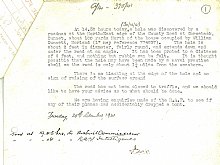 The danger of unexploded bombs continued to threaten Caithness coastal communities. On 30 December a workman found a hole in the road at Corseback, Dunnet. “The hole is about 2 feet in diameter, fairly round, and extends down and under the road at an angle.” The police speculated as to whether it was a naval practice shell “as the road is only 1½ miles from the seashore”; alternatively, “we are having enquiries made of the R.A.F. to see if any of their planes has accidentally dropped a bomb.”
The danger of unexploded bombs continued to threaten Caithness coastal communities. On 30 December a workman found a hole in the road at Corseback, Dunnet. “The hole is about 2 feet in diameter, fairly round, and extends down and under the road at an angle.” The police speculated as to whether it was a naval practice shell “as the road is only 1½ miles from the seashore”; alternatively, “we are having enquiries made of the R.A.F. to see if any of their planes has accidentally dropped a bomb.”
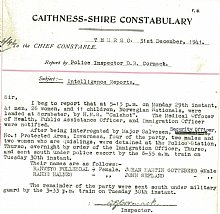 On Monday 29 December the police recorded that 41 men, 26 women and 11 children were landed at Scrabster, all refugees from Norway. The authorities had to interview each person to establish if they were collaborators with the pro-Nazi Quisling regime. “After being interrogated by Major Salveson, Security Officer, No.1 Protected Area, Inverness, four of the party, two males and two women who are quislings, were detained at the Police Station, Thurso, overnight… and sent south under police escort.”
On Monday 29 December the police recorded that 41 men, 26 women and 11 children were landed at Scrabster, all refugees from Norway. The authorities had to interview each person to establish if they were collaborators with the pro-Nazi Quisling regime. “After being interrogated by Major Salveson, Security Officer, No.1 Protected Area, Inverness, four of the party, two males and two women who are quislings, were detained at the Police Station, Thurso, overnight… and sent south under police escort.”
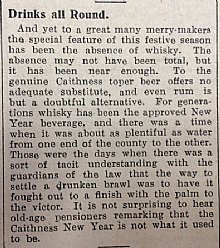 Finally this week, the John O’Groat Journal reflected on the shortage of whisky during the festive season, and looked back fondly to those days “when it was about as plentiful as water from one end of the county to the other.” Even the police in those times, the author reflected, agreed that “the way to settle a drunken brawl was to have it fought out to a finish with the palm to the victor. It is not surprising to hear old-age pensioners remarking that the Caithness New Year is not what it used to be.”
Finally this week, the John O’Groat Journal reflected on the shortage of whisky during the festive season, and looked back fondly to those days “when it was about as plentiful as water from one end of the county to the other.” Even the police in those times, the author reflected, agreed that “the way to settle a drunken brawl was to have it fought out to a finish with the palm to the victor. It is not surprising to hear old-age pensioners remarking that the Caithness New Year is not what it used to be.”
Coming soon! Week 123, 5th - 11th January 1942, will be published on Monday 5th January 2015. To view previous issues please use the menus on the right hand side of the page.
Come and join us on Facebook, let us know what you think about Caithness At War, ask any questions you may have or just say hello! Click on the Facebook link below to be taken directly to our page.
www.facebook.com/caithnessarchives
Comments
The dance that was held in the Gillock school to provide funds for our dear nurse Sinclair who lived in a cottage at Bowermadden. She had a little Morris 8 provided for her and did her best as midwife, first aider etc - NHS was not even mentioned. She attended to me when I was blinded by a splash of lime in my eyr when I watched my Dad whitewash the farm steading. She also lanced a painful boil on my neck - no penicillin though Sulphadimidine was available to the forces. She covered the Parish as each District had their own association.





